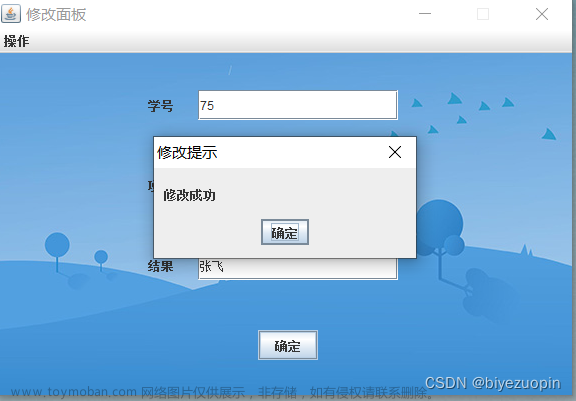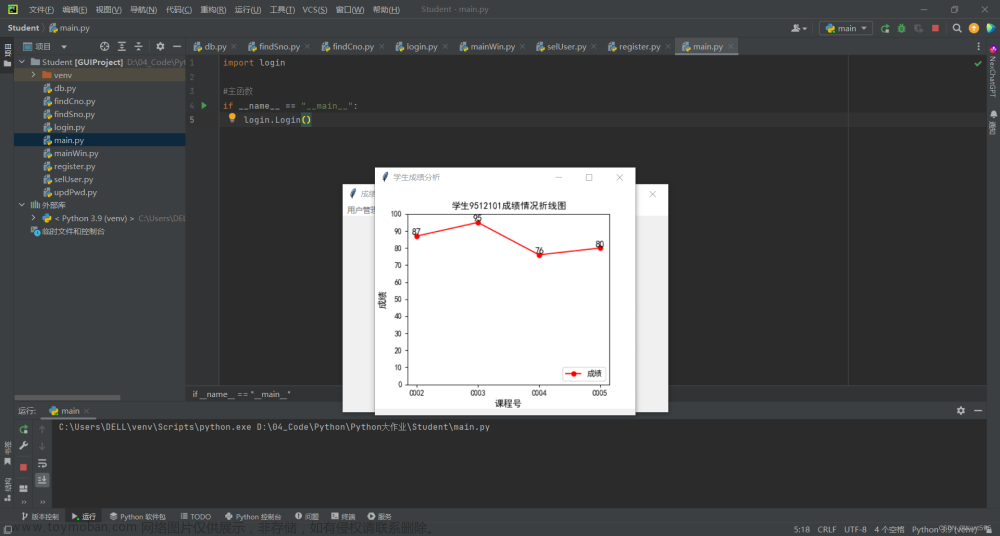末尾获取源码
开发语言:python
后端框架:django
数据库:MySQL5.7
开发软件:Pycharm
是否Maven项目:是
目录
一、项目简介
二、系统功能
三、系统项目截图
四、核心代码
4.1登录相关
4.2文件上传
4.3封装
一、项目简介
网络技术的快速发展给各行各业带来了很大的突破,也给各行各业提供了一种新的管理模块,对于学生成绩管理系统将是又一个传统管理到智能化信息管理的改革,对于传统的学生成绩管理,所包括的信息内容比较多,对于用户想要对这些数据进行管理维护需要花费很大的时间信息,而且对于数据的存储比较麻烦,想要查找某一相关的数据信息比较繁琐,随着互联网大潮的到来,决定开发一套智能化、信息化的学生成绩管理系统,主要对首页,个人中心,教师管理,学生管理,公告信息管理,课程类型管理,课程信息管理,选课信息管理,成绩信息管理等功能模块的管理系统的研发。
本文研究的系统是以Python为语言的学生成绩管理系统设计与实现,它在使用时数据库和程序不会被造成太大的影响,用起来也很得心应手。它也算是当时比较流行的安全性相对也很高的框架之一了,Python开发语言。和mysql数据库,最终完成学生成绩管理系统。
二、系统功能
本课题要求实现一套学生成绩管理系统,系统主要包括管理员,学生和教师三大模块
(a) 管理员;管理员进入系统主要功能包括首页,个人中心,教师管理,学生管理,公告信息管理,课程类型管理,课程信息管理,选课信息管理,成绩信息管理等功能并进行操作。
(b) 教师;教师进入系统主要功能包括首页,个人中心,公告信息管理,课程信息管理,选课信息管理,成绩信息管理等功能并进行操作。
(c) 学生;学生进入系统主要功能包括首页,个人中心,公告信息管理,课程信息管理,选课信息管理,成绩信息管理等功能并进行操作。
三、系统项目截图
系统登录,用户进入系统前在登录页面根据要求填写用户名和密码,选择角色等信息,点击登录进行登录操作,如图5-1所示。

管理员登录系统后,可以对首页,个人中心,教师管理,学生管理,公告信息管理,课程类型管理,课程信息管理,选课信息管理,成绩信息管理等功能进行相应的操作管理,如图5-2所示。

教师管理,在教师管理页面可以对索引,工号,教师姓名,性别,年龄,职称,电话,头像等内容进行详情,修改和删除等操作,如图5-3所示。
学生管理,在学生管理页面可以对索引,学号,学生姓名,性别,班级,专业,手机,头像等信息进行详情,修改和删除等操作,如图5-4所示。
公告信息管理,在公告信息管理页面可以对索引,标题,类型,发布时间等内容进行详情、修改和删除等操作,如图5-5所示。
课程类型管理,在课程类型管理页面可以对索引,课程类型等内容进行修改和删除等操作,如图5-6所示。
课程信息管理,在课程信息管理页面可以对索引,课程名称,课程类型,开课时间,上班地点,工号,教师姓名等内容进行详情,修改和删除等操作,如图5-7所示。
选课信息管理,在选课信息管理页面可以对索引,课程名称,课程类型,开课时间,工号,教师姓名,选课时间,学号,姓名,专业,审核回复,审核状态等内容进行详情,修改和删除等操作,如图5-8所示。
成绩信息管理,在成绩信息管理页面可以对索引,课程名称,学号,学生姓名,成绩,发布时间,工号,教师姓名等内容进行详情,修改和删除等操作,如图5-9所示。
教师登录进入学生成绩管理系统可以对首页,个人中心,公告信息管理,课程信息管理,选课信息管理,成绩信息管理等功能进行相应操作,如图5-10所示。
个人中心,在个人信息页面可以通过填写工号,性别,职称,头像,教师姓名,年龄,电话等内容进行个人信息修改操作,如图5-11所示。
公告信息管理,在公告信息管理页面可以对索引,标题,类型,发布时间等内容进行详情操作,如图5-12所示。
学生登录进入学生成绩管理系统可以对首页,个人中心,公告信息管理,课程信息管理,选课信息管理,成绩信息管理等功能进行相应操作,如图5-13所示。
个人中心,在个人信息页面通过填写学号,性别,专业,头像,学生姓名,班级,手机等内容进行个人信息修改操作,如图5-14所示。 文章来源:https://www.toymoban.com/news/detail-446105.html
文章来源:https://www.toymoban.com/news/detail-446105.html
课程信息管理,在课程信息管理页面可以对索引,课程名称,课程类型,开课时间,上班地点,工号,教师姓名等内容进行详情,选课等操作,如图5-15所示。 文章来源地址https://www.toymoban.com/news/detail-446105.html
文章来源地址https://www.toymoban.com/news/detail-446105.html
四、核心代码
4.1登录相关
package com.controller;
import java.util.Arrays;
import java.util.Calendar;
import java.util.Date;
import java.util.Map;
import javax.servlet.http.HttpServletRequest;
import org.springframework.beans.factory.annotation.Autowired;
import org.springframework.stereotype.Controller;
import org.springframework.web.bind.annotation.GetMapping;
import org.springframework.web.bind.annotation.PathVariable;
import org.springframework.web.bind.annotation.PostMapping;
import org.springframework.web.bind.annotation.RequestBody;
import org.springframework.web.bind.annotation.RequestMapping;
import org.springframework.web.bind.annotation.RequestParam;
import org.springframework.web.bind.annotation.ResponseBody;
import org.springframework.web.bind.annotation.RestController;
import com.annotation.IgnoreAuth;
import com.baomidou.mybatisplus.mapper.EntityWrapper;
import com.entity.TokenEntity;
import com.entity.UserEntity;
import com.service.TokenService;
import com.service.UserService;
import com.utils.CommonUtil;
import com.utils.MD5Util;
import com.utils.MPUtil;
import com.utils.PageUtils;
import com.utils.R;
import com.utils.ValidatorUtils;
/**
* 登录相关
*/
@RequestMapping("users")
@RestController
public class UserController{
@Autowired
private UserService userService;
@Autowired
private TokenService tokenService;
/**
* 登录
*/
@IgnoreAuth
@PostMapping(value = "/login")
public R login(String username, String password, String captcha, HttpServletRequest request) {
UserEntity user = userService.selectOne(new EntityWrapper<UserEntity>().eq("username", username));
if(user==null || !user.getPassword().equals(password)) {
return R.error("账号或密码不正确");
}
String token = tokenService.generateToken(user.getId(),username, "users", user.getRole());
return R.ok().put("token", token);
}
/**
* 注册
*/
@IgnoreAuth
@PostMapping(value = "/register")
public R register(@RequestBody UserEntity user){
// ValidatorUtils.validateEntity(user);
if(userService.selectOne(new EntityWrapper<UserEntity>().eq("username", user.getUsername())) !=null) {
return R.error("用户已存在");
}
userService.insert(user);
return R.ok();
}
/**
* 退出
*/
@GetMapping(value = "logout")
public R logout(HttpServletRequest request) {
request.getSession().invalidate();
return R.ok("退出成功");
}
/**
* 密码重置
*/
@IgnoreAuth
@RequestMapping(value = "/resetPass")
public R resetPass(String username, HttpServletRequest request){
UserEntity user = userService.selectOne(new EntityWrapper<UserEntity>().eq("username", username));
if(user==null) {
return R.error("账号不存在");
}
user.setPassword("123456");
userService.update(user,null);
return R.ok("密码已重置为:123456");
}
/**
* 列表
*/
@RequestMapping("/page")
public R page(@RequestParam Map<String, Object> params,UserEntity user){
EntityWrapper<UserEntity> ew = new EntityWrapper<UserEntity>();
PageUtils page = userService.queryPage(params, MPUtil.sort(MPUtil.between(MPUtil.allLike(ew, user), params), params));
return R.ok().put("data", page);
}
/**
* 列表
*/
@RequestMapping("/list")
public R list( UserEntity user){
EntityWrapper<UserEntity> ew = new EntityWrapper<UserEntity>();
ew.allEq(MPUtil.allEQMapPre( user, "user"));
return R.ok().put("data", userService.selectListView(ew));
}
/**
* 信息
*/
@RequestMapping("/info/{id}")
public R info(@PathVariable("id") String id){
UserEntity user = userService.selectById(id);
return R.ok().put("data", user);
}
/**
* 获取用户的session用户信息
*/
@RequestMapping("/session")
public R getCurrUser(HttpServletRequest request){
Long id = (Long)request.getSession().getAttribute("userId");
UserEntity user = userService.selectById(id);
return R.ok().put("data", user);
}
/**
* 保存
*/
@PostMapping("/save")
public R save(@RequestBody UserEntity user){
// ValidatorUtils.validateEntity(user);
if(userService.selectOne(new EntityWrapper<UserEntity>().eq("username", user.getUsername())) !=null) {
return R.error("用户已存在");
}
userService.insert(user);
return R.ok();
}
/**
* 修改
*/
@RequestMapping("/update")
public R update(@RequestBody UserEntity user){
// ValidatorUtils.validateEntity(user);
userService.updateById(user);//全部更新
return R.ok();
}
/**
* 删除
*/
@RequestMapping("/delete")
public R delete(@RequestBody Long[] ids){
userService.deleteBatchIds(Arrays.asList(ids));
return R.ok();
}
}
4.2文件上传
package com.controller;
import java.io.File;
import java.io.FileNotFoundException;
import java.io.IOException;
import java.util.Arrays;
import java.util.Date;
import java.util.HashMap;
import java.util.List;
import java.util.Map;
import java.util.Random;
import java.util.UUID;
import org.apache.commons.io.FileUtils;
import org.apache.commons.lang3.StringUtils;
import org.springframework.beans.factory.annotation.Autowired;
import org.springframework.http.HttpHeaders;
import org.springframework.http.HttpStatus;
import org.springframework.http.MediaType;
import org.springframework.http.ResponseEntity;
import org.springframework.util.ResourceUtils;
import org.springframework.web.bind.annotation.PathVariable;
import org.springframework.web.bind.annotation.RequestBody;
import org.springframework.web.bind.annotation.RequestMapping;
import org.springframework.web.bind.annotation.RequestParam;
import org.springframework.web.bind.annotation.RestController;
import org.springframework.web.multipart.MultipartFile;
import com.annotation.IgnoreAuth;
import com.baomidou.mybatisplus.mapper.EntityWrapper;
import com.entity.ConfigEntity;
import com.entity.EIException;
import com.service.ConfigService;
import com.utils.R;
/**
* 上传文件映射表
*/
@RestController
@RequestMapping("file")
@SuppressWarnings({"unchecked","rawtypes"})
public class FileController{
@Autowired
private ConfigService configService;
/**
* 上传文件
*/
@RequestMapping("/upload")
public R upload(@RequestParam("file") MultipartFile file,String type) throws Exception {
if (file.isEmpty()) {
throw new EIException("上传文件不能为空");
}
String fileExt = file.getOriginalFilename().substring(file.getOriginalFilename().lastIndexOf(".")+1);
File path = new File(ResourceUtils.getURL("classpath:static").getPath());
if(!path.exists()) {
path = new File("");
}
File upload = new File(path.getAbsolutePath(),"/upload/");
if(!upload.exists()) {
upload.mkdirs();
}
String fileName = new Date().getTime()+"."+fileExt;
File dest = new File(upload.getAbsolutePath()+"/"+fileName);
file.transferTo(dest);
FileUtils.copyFile(dest, new File("C:\\Users\\Desktop\\jiadian\\springbootl7own\\src\\main\\resources\\static\\upload"+"/"+fileName));
if(StringUtils.isNotBlank(type) && type.equals("1")) {
ConfigEntity configEntity = configService.selectOne(new EntityWrapper<ConfigEntity>().eq("name", "faceFile"));
if(configEntity==null) {
configEntity = new ConfigEntity();
configEntity.setName("faceFile");
configEntity.setValue(fileName);
} else {
configEntity.setValue(fileName);
}
configService.insertOrUpdate(configEntity);
}
return R.ok().put("file", fileName);
}
/**
* 下载文件
*/
@IgnoreAuth
@RequestMapping("/download")
public ResponseEntity<byte[]> download(@RequestParam String fileName) {
try {
File path = new File(ResourceUtils.getURL("classpath:static").getPath());
if(!path.exists()) {
path = new File("");
}
File upload = new File(path.getAbsolutePath(),"/upload/");
if(!upload.exists()) {
upload.mkdirs();
}
File file = new File(upload.getAbsolutePath()+"/"+fileName);
if(file.exists()){
/*if(!fileService.canRead(file, SessionManager.getSessionUser())){
getResponse().sendError(403);
}*/
HttpHeaders headers = new HttpHeaders();
headers.setContentType(MediaType.APPLICATION_OCTET_STREAM);
headers.setContentDispositionFormData("attachment", fileName);
return new ResponseEntity<byte[]>(FileUtils.readFileToByteArray(file),headers, HttpStatus.CREATED);
}
} catch (IOException e) {
e.printStackTrace();
}
return new ResponseEntity<byte[]>(HttpStatus.INTERNAL_SERVER_ERROR);
}
}
4.3封装
package com.utils;
import java.util.HashMap;
import java.util.Map;
/**
* 返回数据
*/
public class R extends HashMap<String, Object> {
private static final long serialVersionUID = 1L;
public R() {
put("code", 0);
}
public static R error() {
return error(500, "未知异常,请联系管理员");
}
public static R error(String msg) {
return error(500, msg);
}
public static R error(int code, String msg) {
R r = new R();
r.put("code", code);
r.put("msg", msg);
return r;
}
public static R ok(String msg) {
R r = new R();
r.put("msg", msg);
return r;
}
public static R ok(Map<String, Object> map) {
R r = new R();
r.putAll(map);
return r;
}
public static R ok() {
return new R();
}
public R put(String key, Object value) {
super.put(key, value);
return this;
}
}
到了这里,关于基于Python的学生成绩管理系统的文章就介绍完了。如果您还想了解更多内容,请在右上角搜索TOY模板网以前的文章或继续浏览下面的相关文章,希望大家以后多多支持TOY模板网!










